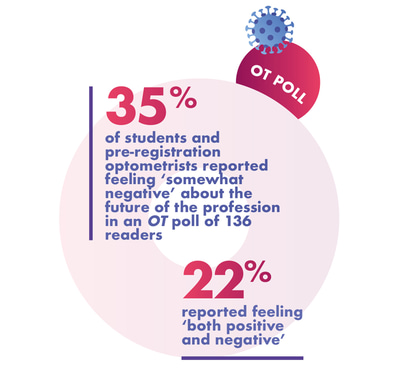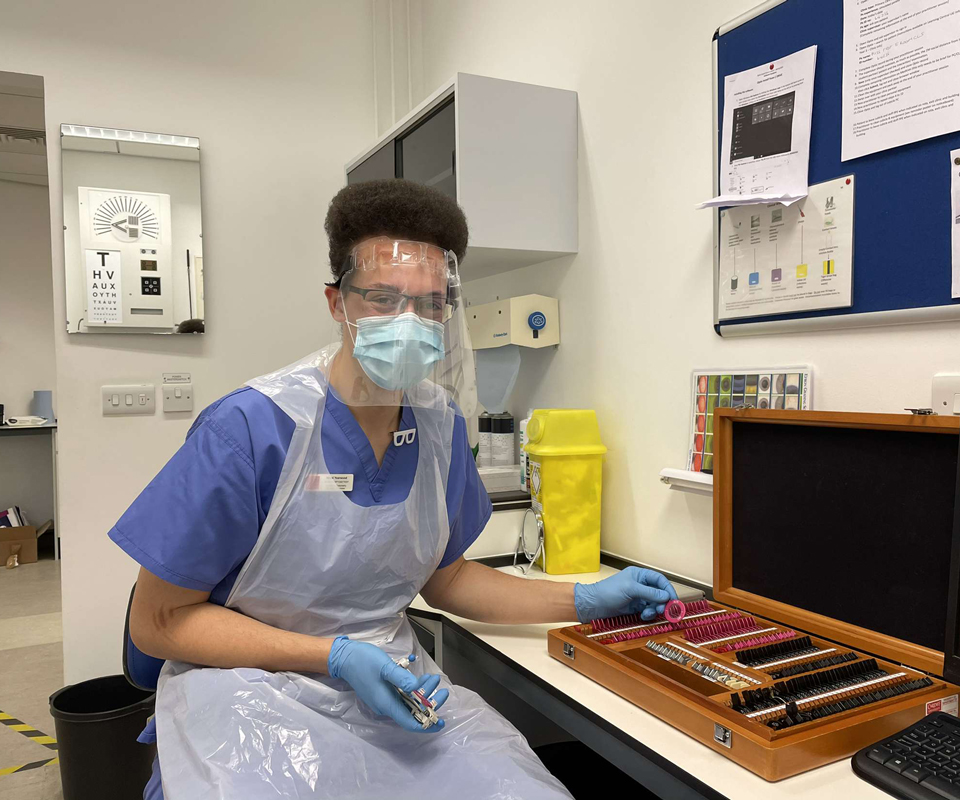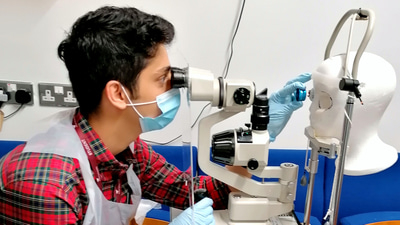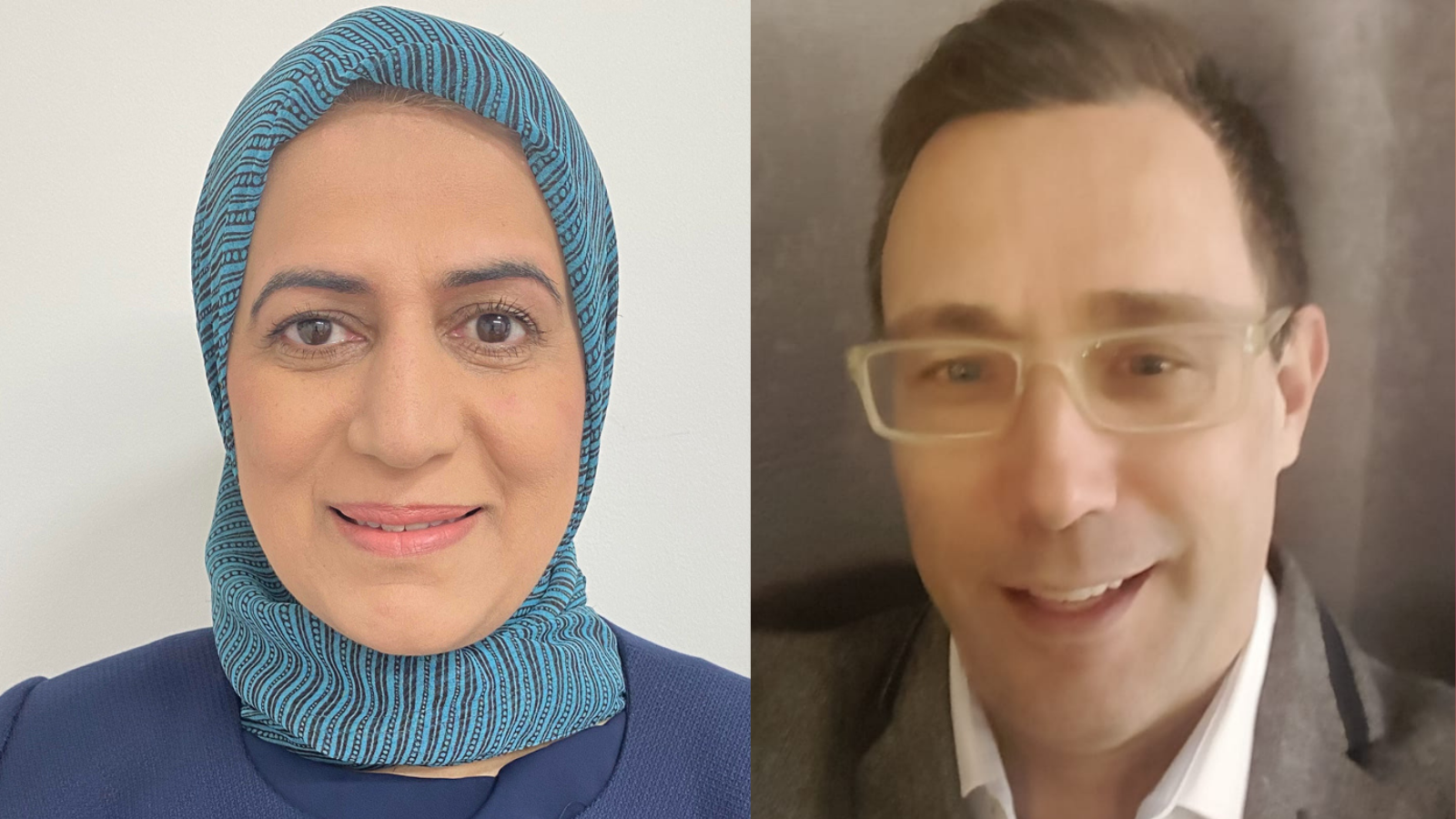- OT
- Life in practice
- Career development
- The future workforce
COVID-Generation
The future workforce
Following a year of disruption, OT investigates what effect the pandemic could have for students and pre-registration optometrists entering the profession – and what the wider implications might be for the way optometry is taught to future generations

20 April 2021
The pandemic has created challenges and disruption for many students and pre-registration optometrists, and the effects are expected to continue in some forms for months, or even years, into the future.
“It is a very tough time to be a student,” Nick Hillman, director of the Higher Education Policy Institute (HEPI), told OT.
Research by the think tank in spring 2020 found that students felt more ‘anxious’ than ‘excited’ about starting their careers, with 28% of those surveyed reporting ‘anxiety’ as their main feeling. While, for many students, the pandemic had not affected their feelings, for one-third (29%), the pandemic had exacerbated their emotions.
Reflecting on these statistics in early 2021, Hillman shared his expectation that these feelings will have continued, telling OT: “In a crisis, big transitions, such as from education to the labour market or from schools to university, are what get disrupted.”
“The crisis has gone on longer than any of us hoped. The longer it goes on, the more worried people will be about making the jump from education to the labour market,” he added.
Luke McRoy-Jones, pre-registration optometrist, AOP council member and chair of the student committee, identified: “There are ongoing worries about pre-registration placement availability, the fate of the job market after the pandemic and also worries about being away from home for extended periods, due to lockdowns, and the health and wellbeing of friends and family.”
Considering the future of the profession
Speaking to OT, optometry students shared their concerns that entry into the profession could feel harder, or perhaps more competitive – with pre-registration students delayed on the Scheme for Registration, and undergraduates seeking to secure available pre-reg placements. Despite this, many are keeping positive.
Indy Ghuman, second year student at Aston University, shared: “I’m feeling positive because I feel that we’re seeing practitioners being a lot more conscious of the adaptations that we’re going through.”
There is an undercurrent of apprehensiveness, Ghuman noted, adding: “If you ask students how they are feeling, I think the number one feeling is: ‘Do I feel ready?’”

This shift began before the pandemic, with greater emphasis on diagnosis and management of patients in the community. The NHS Long Term Plan also set out aims to transform outpatient appointments, including in ophthalmology.
“The COVID-19 pandemic has put further strain on our health services, increasing waiting times and highlighting shortfalls in resourcing, therefore, we are likely to see reforms in health as the country recovers from the pandemic,” McRoy-Jones shared. “I believe that the changes we were due to see will now be accelerated and optometry will evolve much more rapidly as a profession.”
Considering this acceleration and the transformation plans, McRoy-Jones added: “Optometrists have the expertise, equipment and the capacity to be part of these changes and I wholly believe our profession will step up and evolve swiftly. I think we will look back in 10 years-time and see many advancements in the way eye care is delivered in the UK.”
You will know that the class of 2020 is resilient, and in any frontline healthcare profession, you are going to need people with those qualities
A disrupted cohort, a resilient workforce
While students may have complex and conflicting feelings about their entry into the profession, experts suggest that this cohort may also have a unique skillset for the new world of optometry beyond the pandemic.
Charlie Ball, head of higher education intelligence for the student and careers organisation Prospects at Jisc, noted that while work experience and placements have been disrupted, “people have had a very extensive crash course in how to work under pressure and unusual circumstances.”
“I think there will be an element to which the class of 2020 will be viewed as an unusual group with a different set of skills and qualities,” Ball explained. “You will know that the class of 2020 is resilient, and in any frontline healthcare profession, you are going to need people with those qualities.”
In addition to this, businesses have undergone a vast transformation in a short period of time, Ball noted, with the classes of 2020 and 2021 having to become early adopters of new working practices.
In the meantime, the profession is faced with the potential challenge of adapting to the fact that several student cohorts may have had different levels of experience than is usually expected.
Practice group, Leightons, also sees the potential for skills developed through the pandemic to be utilised in the future of patient engagement.
The business does not currently provide pre-registration placements, delivering career development services for newly-qualified optometrists, but acknowledged that it is something they have been looking at, considering how it could be supported in the right way.
Speaking to OT, Andrew Bridges, director of professional services at Leightons, explained that some of the business’ newly qualified optometrists have played a role in areas new to the group over the past year, such as remote care and remote learning.
Leightons is looking at how elements of remote patient support could be incorporated going forwards to enhance patient care and create ‘touchpoints’ of support for services such as contact lenses.
“I think that these are important life skills throughout their professional career,” Bridges said.
Reflecting on the challenges that have faced student optometrists, William Holmes, University of Manchester senior lecturer and chair of the Optometry Schools Council, commented: “In many ways, the experience they are getting is arguably going to equip them to be more creative and problem-solving clinicians than perhaps in the past. People are having to think really hard about what needs to be done, and how it should be done.”
I’ve definitely seen the value in the NHS and it makes me want to be a part of that
Shaping career plans and expectations
With the changes and experiences of the past year, career plans may have shifted, while other paths, such as pursuing self-employment, may seem less tempting.
Research by Prospects of more than 6500 students and graduates found that more than a quarter of respondents (27%) had changed their career plans as a result of the pandemic, with many reporting being inspired by the pandemic response, or moving away from struggling industries.
Training and development opportunities, career progression and work/life balance were the three most important factors students and graduates cited when considering their career options.
Commenting on the outcomes, Ball said the developments in health and social care had encouraged students to see those careers with a “fresh perspective.”
Speaking to OT, optometry students particularly remarked on the increased emphasis on further qualifications and how this has encouraged their future plans.
The student view

Third year student and pre-registration councillor for Optometry Wales, Nkosi Yearwood, told OT: “I think COVID-19 has shown the value of clinical skills and as someone who wants to further their education through professional diplomas after I graduate, this is a great step in the right direction.”
Final year student, Saira Saleem, sees a similar trend suggesting that optometry may have to adapt further to help release some of the pressure on the NHS, adding: “I think this could lead to exciting changes within the profession and more opportunity to be involved in more complex roles.”
For more from Yearwood and Saleem, look out for our student Q&A, which will be live next week.
McRoy-Jones shared the view that the pandemic has reinforced the need to upskill.
“I already had ambitions to consider some postgraduate study, either through the College of Optometrists’ professional certificates, or by enrolling on a clinical Master’s degree, but I believe the pandemic has made my plans much more imminent, to allow me to keep up with an evolving profession and be in a position to offer the best care to my patients and community,” he shared.
He continued: “As I practice in Wales, the ongoing Welsh Eyecare Transformation project will also shape my plans imminently after qualification.”
Ghuman also has a desire to study further, which has been encouraged by the pandemic. He explained: “I’ve definitely seen the value in the NHS and it makes me want to be a part of that and work in the hospital eye service.”
Independent prescribing in particular, Ghuman added, has highlighted the value that optometrists can play in primary care.
One career path that might seem less inviting at this time is self-employment, suggested Ball.
“Events like this do make the locum career look more precarious, and after 12 months of a pandemic, people are quite risk-averse in career decision making,” Ball said. “The one exception is that people might still be keen to go down that route to improve their work-life balance, and that will continue to be a strong driver.”
It wouldn’t be difficult to imagine that online platforms for doing tutorials would have been on the way in the next few years
Evolving teaching and training
Teaching and training will find a middle point between the traditional approaches taken before the pandemic, and the new ways of working brought about over the past year, suggests Hillman.
“One thing that has happened during the crisis, is that academics have got very much more accustomed, and more adept, at using technology and have seen the benefits of this,” he shared.
Reflecting on his own experience of the changes to learning, such as with the use of patient simulators and course material delivered online, Ghuman described seeing “more innovative educational learning resources.”
As the practice environment has changed during the pandemic with greater emphasis on certain technologies and approaches, such as optical coherence tomography or virtual consultations, Ghuman expects these areas could gain more importance for undergraduates in the future.
While some aspects of in-person teaching and assessments cannot be replaced, students have suggested that some virtual approaches could be beneficial beyond the pandemic.
Giving the example of the Scheme for Registration, McRoy-Jones suggested: “Many competencies at Stage 1 and 2 are knowledge and problem-solving based. Assessing these in a virtual environment alongside in-person assessments of practical elements means that standards are not compromised and there could be a greater level of flexibility for trainees to be assessed, demonstrate competence and progress on the Scheme.”
With the possibilities of continued remote care, and a shift towards shared care schemes and satellite clinics, McRoy-Jones argued: “Virtual elements of learning and assessment earlier on could actually better prepare graduates and create a workforce ready for the advancements of tomorrow.”

Optometry courses have always evolved around new technologies, academics suggest, but the core skills will remain as important as ever.
Professor John Siderov, head of department for optometry and vision sciences at the University of Huddersfield, commented: “In my experience, working as an optometrist and educator in a number of jurisdictions in Australia, US and the UK, optometry has always been keen to embrace new technologies and I do not see that changing.”
Educators must, of course, ensure students and graduates are familiar with the newest developments, but Siderov emphasises: “Fundamentally, it is important that we keep a firm basis in the basic and clinical sciences relevant to vision.”
“Graduates need to be able to develop skills to keep abreast of changes and to critically review new technologies as they come into practice,” he said, adding: “This type of approach is what will provide future optometrists the ability to adapt to change in a positive way.”
University curriculums are constantly kept under review, Holmes pointed out. As the pandemic accelerates practice developments, he added: “We’ll probably end up looking a little bit closer at those things as a result.”
“I’m not sure anything is necessarily going to happen that wouldn’t have anyway, but it might just happen a little sooner. Even from an education perspective, it wouldn’t be difficult to imagine that online platforms for doing tutorials would have been on the way in the next few years,” Holmes said.
What will drive how these considerations will be included in the future will depend on the effectiveness of the methods, and how they relate to the student experience.
Not all changes will be permanent, and the student experience will be a key factor in this, agrees Hillman. Giving an example, he explained that while it is easy to become disengaged in a lecture, research suggests “lectures are also students’ favourite way to learn. Most people perceive learning as a social endeavour.
“Though some of the academic work going online is fantastic, the social element is what is really missing, and students want that,” he added.
As the adoption of technology accelerates, what is a key area of training that might need to evolve in response?

Birmingham and Midland Eye Centre’s Dr Waheeda Illahi, consultant optometrist and head of optometry services, and Dr Martin Cardall, senior specialist optometrist and co-ordinator of the hospital’s pre-reg and graduate optometrist placement, shared their views with OT.
“A module on virtual or telephone consultations and telemedicine would be hugely beneficial. Developing effective communication and history extrapolation in order to understand the needs of the patient during telephone consultations has become extremely important during the pandemic. Students need to be aware of potential scenarios where a diagnosis and management plan may need to be formulated just based on patient history and symptoms over the phone with very limited diagnostic information.
“Mock practitioner to patient telephone consultations where students carry out clinical problem solving based on information presented by the patient will allow the student to develop these skills further. This will also reinforce the importance of overcoming barriers to communication. Additional training in these areas at the undergraduate level will allow our future workforce to be well prepared in the event of future pandemics.”
Enacting the GOC’s new requirements
The short-term focus for many universities is supporting students and ensuring compliance with the revised General Optical Council (GOC) handbook requirements, as well as planning for the next academic year.
In the longer-term, discussions are turning to the GOC’s plans for the future of optometry training and education. In February, the council of the GOC approved new education and training requirements developed through the Education Strategic Review (ESR).
Through the new plans, qualifications will be set at a master’s level, and optometry students will need to achieve a single qualification approved by the GOC, instead of the current two-stage approach of pre-registration with an employer. Qualifications will also need to integrate 48 weeks of learning and experience in practice.
The GOC has suggested the changes will ensure optical professionals are equipped to “deliver eye care services in a rapidly changing landscape and meet the needs of future patients.”
The changes could provide greater flexibility for universities and students, but speaking to OT, AOP policy adviser, Kathy Jones, highlighted: “As we’ve been saying for some time, we think there are some significant risks that come with the changes – particularly around whether the funding for universities to deliver them will be available – and these risks will need to be managed closely over the next few years.”
The AOP set out its views of the changes and the impact that the new requirements will have on optometry education in a set of FAQs online.
The financial impact of these changes has been a key concern, and part of the conversation has revolved around course funding.
One avenue the profession is closely observing, is the consultations of The Office for Students (Ofs), which distributes government higher education funding to providers in England. The OfS is due to consult on its proposals for reviewing how course funding is apportioned in England, particularly high cost, strategically important subjects.
A further challenge to navigate is the requirement for practical experience.
Speaking to OT, Holmes commented: “Even if COVID-19 had not happened, a big challenge of the ESR was going to be placement capacity, co-ordinating placements and ensuring variety.”
This becomes a more acute challenge in an environment where placement availability might contract, such as during the pandemic, with business owners needing to focus on other areas.
“The ESR is coming in and asking for more experience, at a time when it is hard to get experience,” Holmes said, adding that this may become easier as practices return to a form of normality beyond the pandemic.
Offering some reassurance for current pre-registration optometrists and students preparing for the Scheme, the AOP policy team noted: “The GOC expects courses under the new requirements to start from 2023 or 2024, but says the College Scheme for Registration will be needed until around 2030 for students who trained under the pre-ESR handbooks.”
In the meantime, the AOP has committed to supporting student and pre-reg members under the current system “to deal with the continuing challenges of COVID-19 and launch safely into their future careers in optometry.”
Many people feel that they want a good job that gives something back
Future students
University applications have risen in the UK this year, with UCAS finding an 11% increase in applications from 18-year-olds, representing more than 2/5 of young people.
This trend is reflected in anecdotal conversations with universities, with Susie King, head of UK and EU admissions at Anglia Ruskin University, telling OT in March that the university had seen a 7.7% increase in applications to its optometry degree for entry in September 2021.
The numbers: applications for subjects allied to medicine
UCAS data from the January 2021 deadline for applications for subjects allied to medicine has shown:
- England: 287,100 in 2021, compared to 223,010 in 2020
- Northern Ireland: 17,850 in 2021, compared to 14,640 in 2020
- Scotland: 31,920 in 2021, compared to 24,690 in 2020
- Wales: 17,330 in 2021, compared to 13,230 in 2020.
Interest in STEM subjects has particularly grown through the pandemic, with a poll by the British Science Association finding that 37% of 14 to 18 year olds surveyed are now more likely to consider a scientific career.
Prospects also expects to see an interest in STEM subjects, particularly in health care professions, as a result of the pandemic.
“Firstly, the health care professions have massively demonstrated their value over the last 12 months,” Ball shared. “The other factor is that, in difficult economic times, people don’t like to take risks and might go for more skilled professions. Health care professions are secure, they provide good training and good paying jobs.”
As well as seeking security, Ball noted that, as students have spent a greater amount of time within the local community, “many people feel that they want a good job that gives something back.”
This might be an area for the optometry profession to explore, Ball said, suggesting that many students might be unsure of how to get into the profession.
The impact of the pandemic on future university students could be “profound,” suggested Hillman, with education over the past two years disrupted for students at both A level and GCSE. One consideration for the future is that students may have had different levels of home-schooling, he said, which might require universities to help students catch up.
Despite the disruption that the first-year university students have already faced, Hillman noted that students are not dropping out of university at higher levels.
Responding to the suggestion that future students could potentially arrive at university at different levels, Siderov commented: “Universities are generally well prepared to meet the needs of a wide range of student abilities.”
For many students and pre-registration optometrists, a clear-eyed commitment to work towards their career goals amidst the challenges is palpable.
“The past 12 months have really highlighted the importance of living life to its fullest, not taking things for granted and loving what you do,” McRoy-Jones told OT. “This has undoubtedly changed my outlook on my career and the values I will look for in future employers and business ventures, as I look forward to a long, varied, and hopefully enjoyable career in optometry.”
Similarly, Ghuman said he is keeping positive and focusing on consolidating knowledge as best as he can. “At some point in the future, we’re going to be seeing patients and helping them because that is what we came into optometry to do.”
Supporting students and pre-registration optometrists
- The Peer Support Line offers a free and confidential helpline for members and non-members at any stage of their career to discuss their problems with a trained peer. The line can be accessed at 0800 870 8401
- Students and pre-reg members can use the AOP’s Pre-reg register to list their availability for a placement
- OT’s education library hosts OT’s skills guides along with archived CET and CPD articles, covering a range of topic areas
- The AOP’s employment team is available to support and advise AOP members on pre-registration contracts and employment law and can be contacted at [email protected].
OT would like to thank the following contributors:
- Kathy Jones, AOP policy adviser and the AOP policy team
- Luke McRoy-Jones, pre-registration optometrist, AOP council member and chair of the student committee
- William Holmes, University of Manchester senior lecturer and chair of the Optometry Schools Council
- Professor John Siderov, head of the department for optometry and vision sciences at the University of Huddersfield
- Indy Ghuman, second-year student at Aston University
- Saira Saleem, optometry student at City, University of London
- Nkosi Yearwood, third year student at Cardiff University and pre-registration councillor for Optometry Wales
- Charlie Ball, head of higher education intelligence for Prospects at Jisc
- Dr Waheeda Illahi, consultant optometrist and head of optometry services, and Dr Martin Cardall, senior specialist optometrist and co-ordinator of pre-reg and graduate optometrist placements at Birmingham and Midland Eye Centre
As COVID-19 continues to impact teaching and training in optometry, OT is ready to hear the experiences and views of the profession. Get in touch to share your thoughts.
This article is part of an OT series exploring the impact of the pandemic on student and pre-registration optometrists, and the longer-term considerations for the future of teaching and training. To read part one, visit www.aop.org.uk/ot/COVIDGeneration.


Comments (0)
You must be logged in to join the discussion. Log in